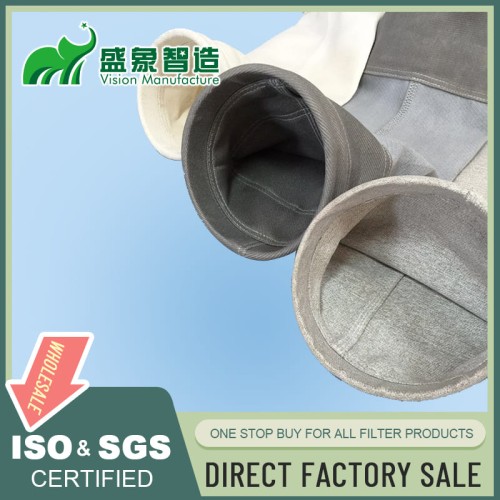
Fiberglass Filter Bags Excel in High-Temperature Industrial Filtration
I. Introduction
High-temperature filtration presents significant challenges in industrial environments, necessitating robust materials capable of withstanding extreme conditions. Fiberglass, as a filter material, plays a crucial role in these settings, offering durability and efficiency that are essential for maintaining operational integrity and compliance with environmental standards.
II. Properties of Fiberglass Filter Bags
- Heat Resistance Characteristics: Fiberglass filter bags can operate continuously at temperatures up to 260°C and handle surges up to 280°C, making them ideal for high-temperature applications.
- Chemical Inertness: These bags exhibit excellent resistance to a wide range of chemicals, ensuring performance in diverse industrial processes.
- Tensile Strength and Durability: Fiberglass provides exceptional strength and durability, resisting wear and tear in harsh environments.
- Filtration Efficiency: These bags maintain effective particle capture, crucial for process consistency and air quality control.
III. Types of Fiberglass Filter Bags
- Woven Fiberglass Bags: Utilized for their intrinsic strength and good filtration efficiency.
- Needle-felt Fiberglass Bags: Offer enhanced filtration capabilities and are suitable for capturing finer particulates.
- PTFE-laminated Fiberglass Bags: Provide superior chemical and heat resistance.
- Specialty Coated Fiberglass Bags: Feature coatings that improve dust release and extend service life.
IV. Applications in Various Industries
Fiberglass filter bags are employed in industries where high temperatures and aggressive chemicals are prevalent:
- Cement and Lime Production: Essential for handling hot gases and capturing particulates.
- Steel and Metal Processing: Used to filter out fine metallic dust and fumes.
- Power Generation Plants: Help manage emissions from coal-fired and waste-to-energy plants.
- Waste Incineration Facilities: Capture toxic and corrosive pollutants.
- Chemical and Petrochemical Industries: Ensure air purity and process integrity.
- Glass Manufacturing: Maintain clean environments crucial for product quality.
V. Design and Construction
- Fiber Composition and Treatment: Fiberglass is often treated to enhance its heat and chemical resistance.
- Weave Patterns and Densities: The density and pattern of the weave affect the filtration properties and durability.
- Bag Shapes and Sizes: Customizable to fit various housings and applications.
- Finishing Treatments and Coatings: Treatments such as singeing, calendering, and coating are applied to improve performance and longevity.
VI. Performance Characteristics
- Temperature Tolerance Range: Fiberglass bags are capable of operating under high temperatures without losing structural integrity.
- Filtration Efficiency Ratings: These bags are rated to capture a high percentage of airborne particles, even under strenuous conditions.
- Pressure Drop Profiles: Designed to minimize pressure drops, thereby enhancing system efficiency.
- Service Life Expectations: Long service life reduces the frequency of replacements and maintenance costs.
VII. Installation Considerations
- Proper Handling Techniques: Essential to prevent damage during installation.
- Cage and Venturi System Compatibility: Must be compatible with existing systems to ensure optimal performance.
- Precoating Procedures: Often necessary to enhance initial filtration efficiency.
- Break-in Period Management: Critical for stabilizing the filter's performance after installation.
VIII. Maintenance and Cleaning
- Inspection Schedules and Methods: Regular checks to ensure optimal performance.
- Cleaning Techniques: Includes pulse-jet, reverse air, and shaker methods tailored to the specific needs of fiberglass media.
- Replacement Indicators: Guidelines for when to replace bags to maintain efficiency.
- Proper Disposal Practices: Ensures environmentally responsible handling of used filters.
IX. Advantages and Limitations
- Benefits in High-Temperature Applications: Exceptional performance in extreme conditions.
- Chemical Resistance Properties: Suitable for harsh chemical environments.
- Durability and Longevity: Long-lasting under continuous use.
- Potential Drawbacks and Considerations: Includes handling sensitivity and cost implications.
X. Cost-Benefit Analysis
- Initial Investment vs. Long-Term Savings: Evaluating the upfront costs against the operational and maintenance savings.
- Energy Efficiency Improvements: Reductions in energy use due to improved airflow dynamics.
- Reduced Downtime and Replacement Frequency: Contributes to overall cost savings.
- Compliance Cost Reduction: Helps meet emission standards, potentially reducing regulatory costs.
XI. Environmental and Safety Considerations
- Emissions Control Capabilities: Effective in reducing particulate emissions.
- Workplace Safety Improvements: Enhances the air quality, contributing to a safer work environment.
- Disposal and Recycling Practices: Focuses on sustainable disposal and recycling of used filter materials.
- Regulatory Compliance Aspects: Meets stringent environmental and safety standards.
XII. Case Studies
Real-world applications demonstrate the effectiveness of fiberglass filter bags in various settings, showcasing their ability to solve complex filtration challenges and deliver significant improvements in performance and operational efficiency.
XIII. Technological Advancements
- Advanced Materials for Enhanced Performance: Innovations in fiber technology that improve durability and filtration efficiency.
- Smart Monitoring Systems Integration: Incorporation of sensors and monitoring systems for better management.
- Energy-efficient Designs: Enhancements that reduce the energy consumption of filtration systems.
- Integration with Plant-wide Automation: Streamlining operations across facilities for improved efficiency.
XIV. Future Trends
Emerging technologies and market demands are shaping the future of fiberglass filtration, with advancements in materials science and system integration poised to enhance performance and sustainability.
XV. Conclusion
Fiberglass filter bags are indispensable in high-temperature industrial applications, offering unmatched performance and reliability. As filtration technology evolves, these bags continue to play a crucial role in meeting both operational demands and environmental standards, making them a wise choice for industries looking to optimize their processes.
Leave a comment

